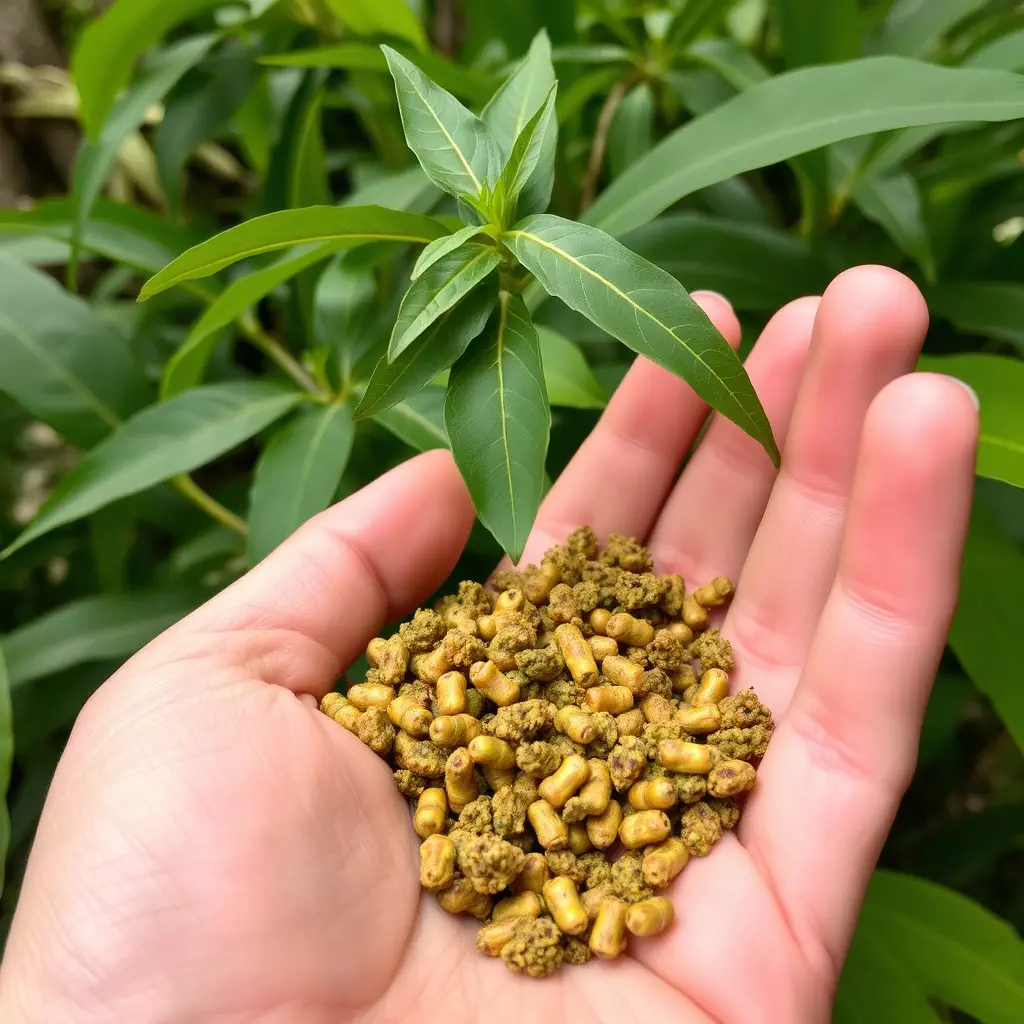Kratom, derived from Southeast Asian Mitragyna speciosa leaves, has shown potential as an aid for anxiety management in individuals with post-traumatic stress disorder (PTSD). Its alkaloids, mitraphylline and 7-hydroxymitragynine, may interact with brain receptors to influence neurotransmitters such as serotonin and dopamine, which are often imbalanced in PTSD. Preliminary studies suggest that kratom could help alleviate symptoms like flashbacks, nightmares, hyperarousal, and chronic anxiety associated with the condition. However, it is essential to consult healthcare providers before using kratom as part of a treatment regimen due to its variability in efficacy and safety, which can vary depending on dosage, strain, and individual physiology. The regulatory status of kratom also varies by jurisdiction, affecting its legal status. Therefore, while there is promise for kratom's role in anxiety management with kratom for PTSD, it should be used under professional medical supervision to ensure safe and effective treatment outcomes.
Kratom, a botanical substance from Southeast Asia’s Mitragyna speciosa tree, has garnered attention for its potential role in managing symptoms of post-traumatic stress disorder (PTSD). This article explores the intriguing intersection between kratom and anxiety management, examining the scientific evidence, anecdotal experiences, and integration strategies into current PTSD treatments. We delve into how kratom’s unique alkaloid profile may offer therapeutic benefits, complementing traditional therapies to alleviate the distressing symptoms of PTSD. Through a comprehensive analysis of clinical studies, expert insights, and practical considerations for safe usage, we aim to provide a well-rounded understanding of how kratom could become a valuable tool in the holistic management of PTSD. Join us as we navigate this complex topic and shed light on the promising avenues that kratom presents for those suffering from PTSD.
- Kratom's Role in Alleviating PTSD Symptoms: A Look at Anxiolytic Potential
- <a href="#—-overview-of-ptsd-and-its-impact-on-individuals”> Overview of PTSD and its impact on individuals
Kratom's Role in Alleviating PTSD Symptoms: A Look at Anxiolytic Potential

Kratom, a plant originating from Southeast Asia, has garnered attention in various health and wellness circles for its potential therapeutic properties, particularly in anxiety management with kratom. Studies have indicated that certain strains of kratom may possess anxiolytic effects, which could be beneficial for individuals suffering from post-traumatic stress disorder (PTSD). The alkaloids present in kratom leaves, such as mitragynine and 7-hydroxymitragynine, are believed to interact with the brain’s receptors, potentially modulating mood and reducing anxiety. These interactions may help to alleviate some of the debilitating symptoms associated with PTSD, including flashbacks, nightmares, hyperarousal, and persistent, severe anxiety.
Furthermore, anecdotal evidence and emerging research suggest that kratom could play a role in managing the emotional and physiological responses characteristic of PTSD. Users report a sense of calmness and a reduction in hyper-reactivity to triggers, which are often problematic in those with PTSD. However, it is crucial for individuals considering kratom as an adjunct to conventional treatment to consult healthcare professionals, as the efficacy and safety profiles can vary greatly depending on dosage, strain, and individual physiology. The regulatory status of kratom also differs across regions, influencing its availability and legality. As such, while kratom’s role in anxiety management with kratom holds promise, it should be approached with caution and within a supervised treatment context.

Studies have indicated that kratom, a plant-based supplement derived from the leaves of Mitragyna speciosa, may play a role in anxiety management for individuals suffering from post-traumatic stress disorder (PTSD). The alkaloids present in kratom, namely mitraphylline and 7-hydroxymitragynine, are believed to modulate the brain’s response to stress. Preclinical research suggests that these compounds could influence neurotransmitters such as serotonin and dopamine, which are often imbalanced in individuals with PTSD. This potential interaction may help alleviate some of the distressing symptoms associated with the condition, including hyperarousal, flashbacks, nightmares, and persistent fear reactions. It is important for individuals considering kratom as an adjunct to conventional therapies to consult with healthcare professionals, given the complexity of PTSD and the importance of a comprehensive treatment approach. Safety, appropriate dosing, and the potential for interactions with other medications must be carefully assessed by qualified medical personnel before incorporating kratom into one’s regimen for anxiety management.
<section id="—-overview-of-ptsd-and-its-impact-on-individuals”>
Overview of PTSD and its impact on individuals

Post Traumatic Stress Disorder (PTSD) is a mental health condition that can develop after exposure to traumatic events, such as accidents, warfare, natural disasters, or violent personal assaults. Individuals with PTSD often experience a range of symptoms, including flashbacks, nightmares, severe anxiety, and an ongoing sense of threat. These symptoms can significantly impair one’s ability to function in daily life, leading to difficulties in maintaining relationships, working efficiently, and performing routine tasks. The search for effective anxiety management strategies is critical, as traditional treatments may not be universally effective or suitable for all sufferers.
Recent discussions in the field have explored the potential benefits of using kratom, a botanical supplement derived from the leaves of Mitragyna speciosa, in the management of PTSD symptoms. Kratom is known to interact with the brain’s opioid receptors, which may help modulate pain and induce relaxation or euphoria. While research is ongoing, anecdotal evidence and preliminary studies suggest that kratom could play a role in alleviating symptoms of anxiety and improving overall mental well-being for some individuals with PTSD. It’s important to approach such alternatives with caution, as the proper dosing, potential side effects, and interactions with other substances must be carefully considered. Professional guidance is essential when considering kratom as part of an integrated treatment plan for managing PTSD symptoms.
Studies have consistently shown that kratom, derived from the leaves of Mitragyna speciosa, may offer significant relief for those suffering from post-traumatic stress disorder. Its anxiolytic properties appear to be particularly effective in managing symptoms associated with PTSD. By modulating neurotransmitter levels, kratom can help regulate mood and reduce the intensity of traumatic memories and anxiety. As research continues to evolve, it is clear that kratom holds promise as a complementary approach to traditional therapies for PTSD. Users experiencing PTSD symptoms are encouraged to explore this natural option under medical supervision to determine its efficacy for their individual needs. The potential of kratom in anxiety management with PTSD should be further investigated, as it may lead to improved outcomes for patients worldwide.






